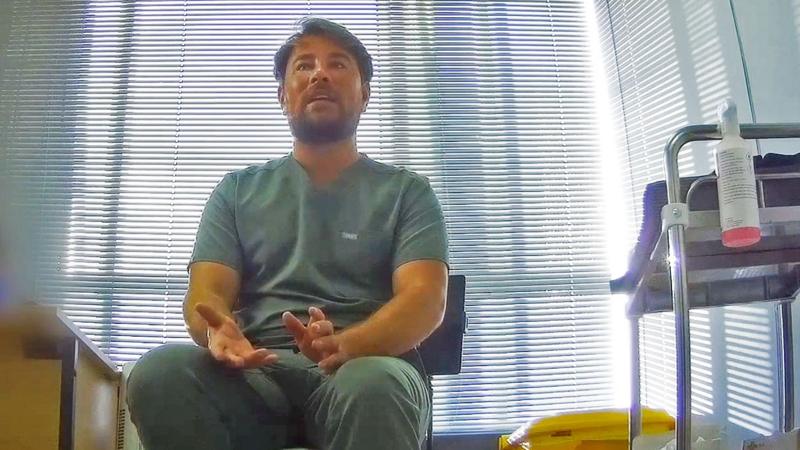An individual claiming to be a “beauty consultant,” whose roster of high-profile clients includes Katie Price, is reportedly providing potentially hazardous cosmetic treatments and distributing medications unlawfully, according to a BBC investigation.
Ricky Sawyer focuses on liquid Brazilian butt-lifts (BBLs), a procedure that involves injecting dermal fillers into the buttocks to enhance their shape and size.
The BBC News has interviewed five of Sawyer’s former clients who required emergency medical attention following their treatments. Additionally, we’ve reviewed statements from more than 30 women reporting severe complications, including sepsis and necrosis (dead tissue).
One client recounted that, after the session, she felt she would “rather have died” than endure the excruciating pain she experienced post-treatment.
Multiple local councils have prohibited Mr. Sawyer from operating in their jurisdictions.
Undercover footage reveals Mr. Sawyer dispensing antibiotics without a legitimate prescription – a criminal act. He lacks the credentials to prescribe medications, and the pills were not labeled for any specific patient.
Furthermore, he proposed administering escalating doses of local anesthetic with no qualified prescriber present — again illegal — and failed to inquire about our reporter’s weight, thereby risking an overdose.
Under the guise of interested clients, we successfully arranged a 45-minute appointment with Mr. Sawyer through his Instagram account, expressing our desire for a 200ml (7fl oz) liquid BBL injection priced at £1,200, with a £200 deposit already paid.
Despite his claims of performing liquid BBLs with oversight from an “ultrasound specialist doctor,” no such professional was present at the pop-up clinic he operated from a small office in East London, a setting unsuitable for medical procedures and heightening the risk of infection.
Within moments of arriving, Mr. Sawyer began to suggest the possibility of increasing the filler amount. “You might be surprised by how much product you can have and still appear natural,” he remarked.
By the conclusion of the appointment, Mr. Sawyer had proposed injecting a staggering one liter of filler — 500ml (almost a pint) per buttock — for £2,000.
We chose not to proceed with the treatment and later returned to confront him about our findings. However, he declined to engage with our inquiries and closed the door in our reporter’s face.
Medical professional Dalvi Humzah, who is part of the Joint Council of Cosmetic Practitioners, reviewed our recordings and labeled Mr. Sawyer’s behavior as “shocking” and “very dangerous,” endangering patients with significant infection risks and potentially fatal complications.
“The risk associated with injecting that volume at once is considerable,” he stated. “If there is an infection in such a large area, it can trigger severe systemic responses like sepsis — or even result in death.”
The filler commonly utilized for liquid BBLs typically comprises hyaluronic acid, a substance also prevalent in facial injectables. Due to the large quantities used in BBLs, the procedure carries risks of severe complications, including blood clots and sepsis, thus categorizing it as one of the more perilous cosmetic interventions available.
Mr. Sawyer claimed on film that he conducted up to seven treatments daily, six days a week, raking in substantial fees per client.
Joanne, a mother of two from South Wales, is one of the women who reported experiencing grave complications after undergoing a liquid BBL with Mr. Sawyer. After being lured by his advertising and endorsements, she traveled seven hours to Essex for her treatment, seeking a “peachy bum.”
However, upon her arrival, she hesitated. After receiving only a postal code, she found herself in an industrial area. Eventually, she discovered a small door leading into a residential building where she was instructed to wait in a “dingy little hallway” for approximately 30 minutes.
“I should have turned around and left,” she said. “But I had already paid my £600 deposit and traveled so far.”
Once inside the cramped examination room, furnished with merely a bed, a small stool, and a counter, she finally met Ricky Sawyer.
After counting out the remaining balance — totalling £2,000 — she was asked to stand while he sat on a stool. As he began to inject her with a liter (1.8 pints) of filler, she quickly became overwhelmed by pain.
“I felt dizzy, nauseous, and shaky. My legs wouldn’t even operate properly. And this was just moments after he started,” she recalled, noting that he wore blood-stained gloves throughout the procedure.
By the end, Joanne was in severe pain: “I was suffering so much; my backside looked utterly disfigured.”
She could hardly sit down, and upon returning home, the swelling began, making it difficult to walk.
She texted Mr. Sawyer repeatedly expressing her distress, but he merely instructed her to take antibiotics.
At that stage, sepsis had already begun to manifest.
“My temperature kept rising, and I felt awful,” Joanne recounted. “I had to call for an ambulance. I was sweating profusely and screaming.”
In the hospital, she received intravenous antibiotics. At one point, a surgeon marked her buttock to indicate a possible surgical intervention due to the swift spread of infection.
When Joanne informed Mr. Sawyer of her hospitalization due to sepsis, he subsequently blocked her on Instagram.
Fortunately, she did not require surgery.
In contrast, another of Mr. Sawyer’s clients, Louise Moller, needed urgent, life-saving surgery.
Four days after receiving a liquid BBL at his Essex clinic in October 2023, the 28-year-old from Bolton found herself in the emergency department.
She called her mother, Janet, from Salford Royal’s A&E, stating: “Mum, I think I’m going to die.”
Louise had developed sepsis, and surgeons warned her that her life was in jeopardy. To halt the infection from advancing, they surgically removed dead tissue from an area encompassing nearly her entire left buttock.
Janet vowed to protect others from undergoing similar experiences and reported Ricky Sawyer to their local police.
“How can he continue to operate knowing he could cause someone’s death?” she asked the BBC.
However, Louise’s situation illustrates the challenges of holding such practitioners accountable. Janet learned from police in Bolton that the matter would need to be forwarded to Essex Police, where the incident occurred.
Although prosecution could be challenging due to Louise having signed a consent form, the police advised her.
The BBC News team contacted both Greater Manchester Police and Essex Police for updates on the case; each stated that the other was responsible for the investigation.
From a legal standpoint, little prevents Mr. Sawyer from continuing his practice. Injecting dermal fillers is classified as non-surgical and remains unregulated, allowing virtually anyone to perform such procedures without the threat of revocation from practice.
In September 2024, Alice Webb was reportedly the first individual in the UK to die following a liquid BBL. Her procedure was not conducted by Ricky Sawyer.
In the aftermath of her passing, Save Face, an organization advocating for stricter regulation of non-surgical procedures, called for legislation forbidding liquid BBLs to be performed by anyone lacking certification from the General Medical Council (GMC).
Ashton Collins, the founder of Save Face, revealed that her organization has received grievances from 39 women against Ricky Sawyer, all who have indicated they necessitated urgent hospital care after undergoing BBLs and suffered from complications like sepsis, necrosis, and disfigurement.
“We’ve urged these women to report their experiences to the authorities,” she stated. “Some have done so, yet nothing appears to happen.”
Thus far, the most decisive actions have been taken by local councils, with three — Glasgow City Council, Epping Forest District Council, and Brentwood Council — confirming that they have issued prohibition notices under health and safety legislation to prevent serious harm to the public.
“But he just moves on to various regions and continues his practices,” Ms. Collins remarked.
We presented our evidence to the Department of Health and Social Care, which acknowledged it was “urgently exploring options for tougher regulations.”
The Department described our findings as “shocking” and asserted that those found dispensing medication without a license ought to face severe legal consequences.
We attempted to confront Ricky Sawyer in person at his East London clinic to address our allegations. Upon recognizing our camera, he attempted to shut the door on us, retreating behind it.
We inquired whether he was acting unlawfully by dispensing prescription-only medications and whether he had any comments for the women reporting severe injuries that necessitated emergency care.
“No,” he replied abruptly and instructed us to leave.
Ashton Collins emphasized the pressing need to take the threats posed by unregulated cosmetic procedures more seriously.
“The prevailing attitude seems to be that these are merely frivolous women who are making foolish decisions driven by vanity, and that it’s their fault,” she noted.
This perception needs to shift, she continued: “Individuals are engaging in perilous activities with people’s lives, often without consequence.”


